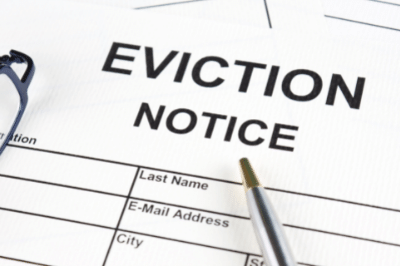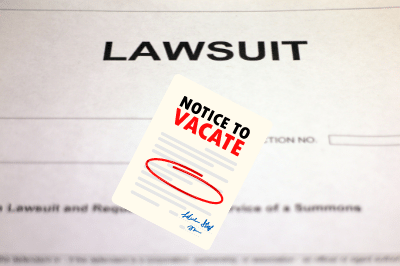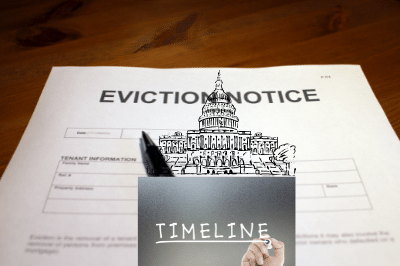If you’re a landlord in Washington state, it’s important to be familiar with the eviction process. The eviction process can be complicated and vary from state to state. In Washington, there are specific steps that must be followed in order for an eviction to be legal.
Eviction Reasons
In Washington, eviction notices can be given for several reasons, including:
– Nonpayment of rent: If a tenant doesn’t pay their rent, they can be given an eviction notice. The landlord must give the tenant at least 3 days’ notice to pay the rent or move out before they can file for eviction. If the tenant fails to pay rent or move out, the landlord can file for eviction. Not paying rent is the most common reason for eviction.
– Violation of lease: If a tenant violates their lease agreement, they can be given an eviction notice. The landlord must give the tenant at least 10 days’ notice to fix the violation or move out before they can file for eviction. Lease violations can include things like having unauthorized guests, smoking in the property, or not keeping the property clean.
– Breaking the lease: If a tenant breaks their lease, they can be given an eviction notice. The landlord must give the tenant at least 3 days’ notice to fix the issue or move out before they can file for eviction. A lease or rental agreement can include a specific clause stating the consequences for breaking the lease.
– Damaging the property: If a tenant damages the property, they can be given an eviction notice. The landlord must give the tenant at least 3 days’ notice to fix the issue or move out before they can file for eviction.
– Nuisance behavior: If a tenant is causing a disturbance or nuisance, the landlord can give them an eviction notice. The landlord must give the tenant at least 10 days’ notice to fix the issue or move out before they can file for eviction.
You can only evict tenants for these specific reasons. Landlords cannot evict tenants for personal reasons, such as the tenant’s race, religion, or gender.
Filing a Complaint

In order to evict a tenant, the landlord must file a complaint with the court. The landlord can do this themselves or hire an eviction lawyer. The eviction lawyer will help to file the complaint and represent the landlord in court. A rental property management company can also evict on behalf of the landlord. Filing fees vary depending on the court and can range from $120 to $335. Hiring an attorney typically costs you attorney’s fees around $350 to $500.
The complaint must include:
– The reason for the eviction
– The amount of rent owed if any
– A copy of the lease or rental agreement
Union tenant counselors can help with this form.
Service of Process
Once the complaint is filed, the tenant must be served with a summons and complaint. This is usually done by a process server. The process server will hand the summons and complaint to the tenant or post it on their door. A rental unit can not be posted with an eviction notice. If a tenant files an answer to the eviction complaint, a hearing will be set.
Serving notice to tenant
The eviction notice must be served to the tenant in person. The landlord can’t serve the eviction notice by mail or email. The eviction notice must also be signed by the landlord.
Types of Eviction Notices
There are three types of eviction notices in Washington state:
– Pay or Quit: This eviction notice is given to a tenant who doesn’t pay their rent. The tenant has 3 days to pay the rent or move out. Unpaid rent can also be included in the eviction notice.
– Cure or Quit: This eviction notice is given to a tenant who breaks their lease. The tenant has 3 days to fix the issue or move out.
– Unlawful Detainer: This eviction notice is given to a tenant who is causing a disturbance or nuisance. The tenant has 10 days to pay or vacate.

Filing an eviction lawsuit

After the eviction notice has been served, the landlord can file an eviction lawsuit with the court if the tenant doesn’t comply. The eviction lawsuit is called a “forcible entry and detainer” action. Unlawful detainer action must be filed within one year of the eviction notice being served.
A sheriff will serve the eviction lawsuit to the tenant. The eviction lawsuit will have a court date. The tenant can choose to appear in court or not. If the tenant doesn’t show up to court, the eviction will likely be granted.
If the tenant does show up to court, the judge will hear both sides and make a decision. The judge can decide to:
– Dismiss the eviction case
– Grant the eviction
– Give the tenant more time to move out
– Order the landlord to pay the tenant’s attorney fees
Appealing an eviction decision
If either the landlord or tenant is unhappy with the judge’s decision, they can appeal it. An appeal must be filed
Writ of restitution Washington state
If the court rules in favor of the landlord, they will issue a writ of restitution. The writ of restitution is an order for the tenant to be eviction. The sheriff will evict the tenant and remove their belongings from the property. It’s important to note that the landlord is not allowed to do this themselves. They must hire a professional eviction company to do this. Washington State tenants have up to 21 days to appeal the eviction. Evicting tenants in Washington state is a process that can take weeks or even months.
Eviction timeline Washington state
The eviction process can take several weeks or even months. The timeline will depend on the type of eviction notice and the court’s schedule. Washington eviction process timeline:
– 3 days for a payor quit eviction notice
– 3 days for a cure or quit eviction notice
– 10 days for an unlawful detainer eviction notice
– One year for an unlawful detainer eviction lawsuit
– Writ of restitution issued by the court

– Sheriff evicted the tenant and removed their belongings from the property.
Evicting tenants can be a long and complicated process. Make sure you familiarize yourself with the eviction process in Washington state before attempting to evict a tenant. For more information, please contact 253 Houses.
Want to sell your property after evicting someone?
We buy houses and help property owners like yourself who may not know where to turn or what options they have available to them with all the professional help they might need. Can’t sell your house because you owe taxes or want to avoid foreclosure, in a tight budget, and want to settle debt quickly, etc.? IRS Lien is closing on you? Do you want to sell your house but the property requires extensive repairs? Want to sell your house but a real Estate Agent charges so much closing costs? 253 Houses can most certainly help you! Just Fill up the form below, or call us at (253) 330-8228 and you will receive a fair cash offer for your home within 24 hours, with no hidden fees or closing costs!

